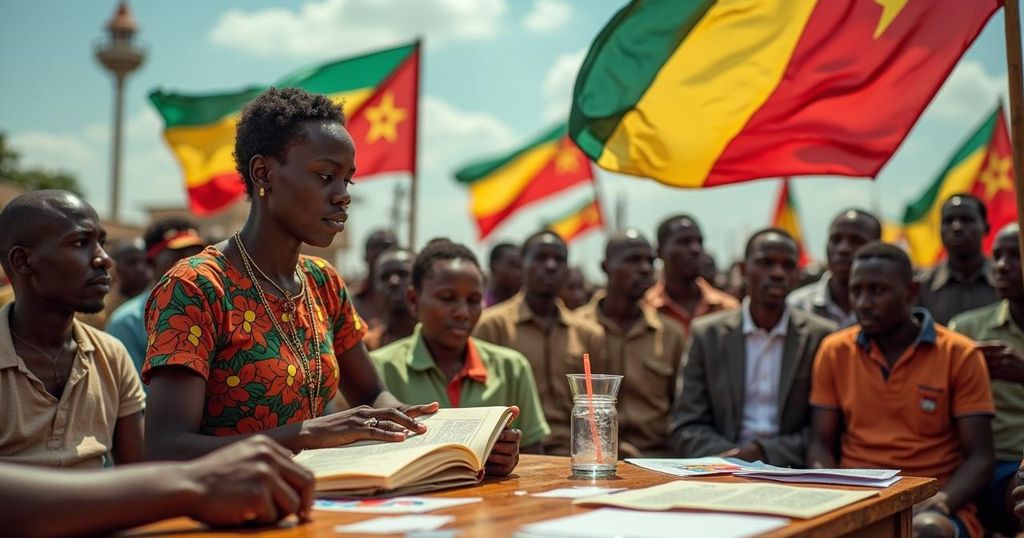Mozambique Awaits Election Results Amidst Allegations of Fraud and Political Tensions

Mozambique’s recent elections saw peaceful voting amid claims of electoral fraud against the ruling Frelimo party, which has governed for 49 years. Daniel Chapo, the party’s candidate, is favored to win, facing challenges from independent candidate Venancio Mondlane. Concerns about the electoral process have been raised by various candidates. The results will impact Mozambique’s political future amidst ongoing challenges including economic hardship and security issues.
Mozambique is currently awaiting the results of its recent general elections, which took place on October 9, 2024. The elections were marked by the peaceful conduct of voting, although there have been allegations of electoral fraud and manipulation from opposition candidates against the ruling Front for the Liberation of Mozambique (Frelimo) party. The counting of votes commenced immediately after polls closed, with preliminary results expected to be available within days, and final results needing to be submitted to the Constitutional Council within a 15-day period for formal ratification. Frelimo, which has maintained power since the country achieved independence from Portugal in 1975, is led by presidential candidate Daniel Chapo, who is perceived as a new face for the party following his unexpected victory in an internal nomination process. While he is favored to succeed outgoing President Filipe Nyusi, his primary challenger, independent candidate Venancio Mondlane, has garnered support from a youthful demographic dissatisfied with rising unemployment and corruption. Mondlane and other presidential candidates have raised serious concerns regarding the electoral process, including accusations that ballot boxes were unsealed prematurely and that party delegates faced obstacles in monitoring procedures, which raises alarm over the integrity of the election. Despite prior accusations against Frelimo regarding electoral manipulation, the head of the European Union’s observer mission indicated that no significant issues were reported on the polling day. Mozambique is presently battling numerous challenges, including instability due to a jihadi insurgency in the Cabo Delgado province, which has displaced many citizens and disrupted significant economic projects. The country is also recovering from the aftermath of climate-related disasters, which have compounded its vulnerabilities. Amid these challenges, various parties are contesting for leadership positions, with voting conducted for the presidency, parliamentary seats, and provincial governors.
The landscape of Mozambique’s political dynamics has been significantly shaped by its historical context. After gaining independence from colonial rule in 1975, Frelimo established itself as the ruling party and solidified its power, transforming Mozambique into a one-party state. Following a protracted civil war that lasted from 1977 until 1992, a peace agreement allowed for the emergence of opposition parties, primarily Renamo, leading to a subsequent multi-party electoral system. Despite periods of tension and conflict, including outbreaks of violence as recent as 2013, Mozambique has navigated various elections since the mid-1990s. The Frelimo party’s long-standing governance invites scrutiny regarding its electoral legitimacy, with numerous allegations of electoral fraud persistently surfacing. In the backdrop of these elections, economic development remains hindered by not only political strife but also by environmental challenges, including climate-related disasters and a growing insurgency in the north, all of which contribute to a prevailing atmosphere of uncertainty among voters. This election, therefore, embodies not just a contest for leadership, but also a key moment for national dialogue regarding governance, accountability, and sustainable development in a country rich in resources yet beset by complex problems.
As Mozambique awaits the election results, the implications of this electoral cycle extend beyond mere leadership change; it reflects the citizens’ grievances towards the existing governance model. With Frelimo poised to potentially extend its dominance, questions regarding electoral integrity and the voices of discontent among younger voters become crucially significant in shaping Mozambique’s political future. The engagement of grassroots movements led by candidates like Venancio Mondlane indicates a growing demand for reform and accountability, suggesting that the outcomes of these elections could play a pivotal role in defining the trajectory of the nation’s governance and stability in the years to come.
Original Source: apnews.com








